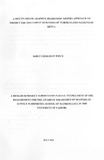| dc.description.abstract | Precise and accurate predictive models are extremely important in tuberculosis (TB)
treatment outcome modeling. Tuberculosis (TB) treatment with patient supervision and
support is one of the elements of global plan to stop TB designed by World Health Organization
in 2006 that requires prediction of patient treatment outcome in order to determine
how intensive should be the level of supplying services and supports in DOTS (directly-
observed treatment, Sh01i course). This study was aimed to develop a model using
MARS technique to forecast TB cases treatment outcomes. MARS is a relatively new
methodology, due to Friedman, for nonlinear regression modeling. MARS can be conceptualized
as a generalization of recursive partitioning that uses spline fitting in lieu of other
simple functions. Given a set of predictor variables, MARS fits a model in the form of an
expansion in product spline basis functions of predictors chosen during a forward and
backward recursive partitioning strategy. MARS produces continuous models for high dimensional
data that can have multiple partitions and predictor variable interactions.
The five given outcomes included getting cured, completion of treatment courses, quit
the treatment course or out of control, fail in treatment, and death. 16 predictor variables
were applied as predictors. The data set with 4,605 Kenyan patients was divided as training
to build a model and testing datasets to check the predictive ability of MARS model.
ine (9) variables were identified as important by the MARS algorithm and 8 basis functions
were created for model building.
The Predictive model was developed by learning from given historical datasets, based
on an MARS algorithm. After applying the developed model by training set, the validation
set risk estimate was 0.1725. In conclusion, the good results obtained in this application
suggest that the proposed MARS prediction model is highly reasonable, desirable and effective
in producing a valid and transparent intelligent exploratory predictive model in
predicting multiple response variables. To support TB patients actively, this valid model
can support health workers to realize how intensive their follow up should be in frame of
DOTS. | en |

